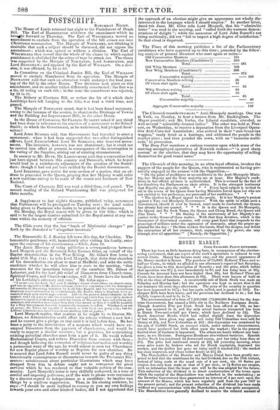The Honourable E. J. Stanley left town this day, for
Cheshire. The honourable gentleman will, immediately after visiting his family, enter upon the canvass of his constituency.—Globe, June 19.
The Leeds Mercury of today publishes a correspondence between Lord Morpeth and the Reverend John Eustace Giles, on behalf of the Baptist denomination in the West Riding. Mr. Giles's first letter is dated 27th May 1841: he tells Lord Morpeth, that forty-four churches of his denomination are about to meet at Sheffield ; and asks the noble candidate whether he will allow him to state to the meeting, "that measures for the immediate release of the excellent Mr. Baines of Leicester, and for the bond fide relief of Dissenters from Church-rates, Spiritual Courts, and Church-extension, will in future have the benefit of his Lordship's advocacy and vote." Mr. Giles says- " I assure yon, my Lord, that your Lrvdship's recent observation: on church-rates, and vote in opposition to Mr. Raines's release, viewed in connexion with the disrespect- ful remarks ou Dissenting ministers by Lord John Russell, and the very uncourteous treatment received from him by tow-missionary, Mr. Knibb, when in England, have oc- casioned much pain and di,appo:ntruent. Indeed, the present Administration, by the neglect. and I am sorry to add, the occasional contempt which they base lately deemed themselves justified in showing towards the claims of Dissenters, have inflicted on our ministers and churches more injury than they ever meant, or than it would be possible for a Tory Government, however tyrannically disposed. to inflict. Whether iu or out of power, the Tories are capable of injuring us with their own party only; but the Liberal Administration have lowered our standing with all parties." Lord Morpeth replies, that anxious as he might be to liberate Mr. Baines, no Administration could effect his release without a new law ; and he cannot give a pledge on that until it is laid before him. He has been a party to the introduction of a measure which would have ex- empted Dissenters from the payment of church-rates, and would be ready to support a similar measure ; but a provision for maintaining existing parochial churches must form a part of it. He would reform Ecclesiastical Courts, and relieve Dissenters from contact with them ; and though believing the extension of religious instruction and worship a paramount want of the age, he would almost as soon tax Churchmen for new Baptist places of worship as Baptists for new churches. He is assured that Lord John Russell could never be guilty of any thing intentionally contemptuous or discourteous towards the Protestant Dis- senters : sensitiveness about particidar illustrations which may have dropped from him in debate ought not to overpower the great services which he has rendered to that valuable portion of the com- munity. Lord Morpeth's letter is very skilfully composed, in a tone of . cordial and imposing politeness, as if the wish to please were restrained by a discreet regard to independence as a candidate : he implies vast -things by a studious suppression. Thus, in his closing sentence, be says—"I should be more inclined to convey to you my own feelings towards your own and other kindred bodies, did I not apprehend that
the approach of an election might give an appearance not wholly dis- interested to the language which I should employ." In another letter, dated 8th June, Mr. Giles tells Lord Morpeth, that his "admirable letter " was read to the meeting, and " called forth the warmest demon- strations of delight "; while the assurance of Lord John Russell's not being unfriendly, did not " fail to impart a high degree of satisfaction."
So that cloud is dispersed. •


























 Previous page
Previous page